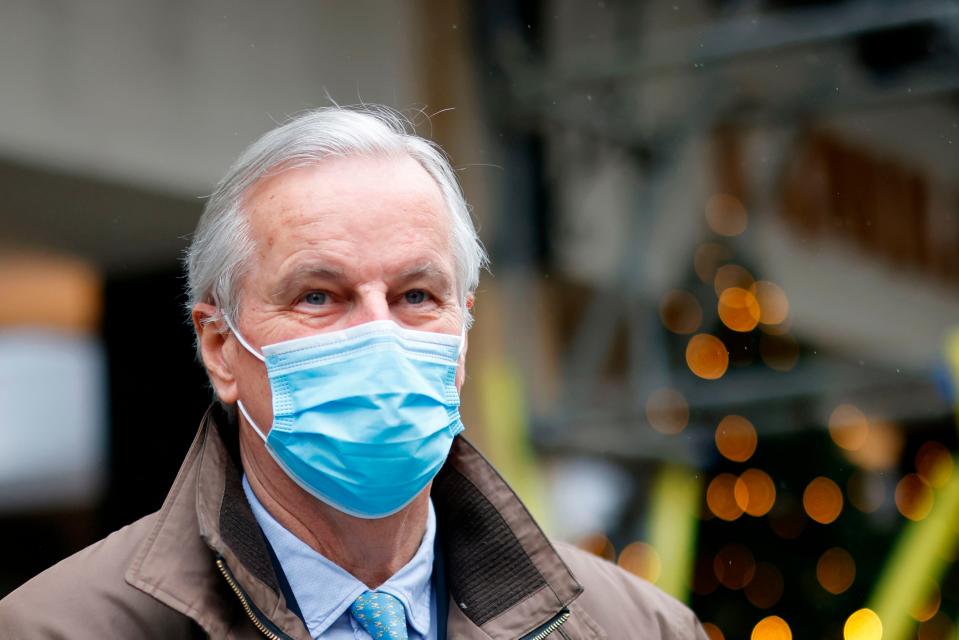Brexit trade talks put on ‘pause’ as negotiators in London and Brussels say ‘significant divergences’ remain

Breaking New
(AFP via Getty Images)Brexit trade talks have been paused after negotiators in London and Brussels failed to reach an agreement, insisting that “significant divergences” still remain.
Boris Johnson and Ursula von der Leyen, the president of the European Commission, will discuss the “state of play” in a telephone call on Saturday with just weeks remaining until the end of the transition period.
Despite suggestions of an “imminent” agreement, the UK government’s negotiator, Lord David Frost, and his EU counterpart, Michel Barnier, issued a joint statement on Friday evening offering a pessimistic assessment of the negotiations.
“We agreed today that the conditions for an agreement are not met, due to significant divergences on a level playing field, governance and fisheries,” they said.
“We agreed to pause the talks in order to brief our principles on the state of play of the negotiations. President von der Leyen and prime minister Johnson will discuss the state of play tomorrow afternoon.”
Earlier, an EU official close to the negotiations told Reuters news agency that a deal was expected to be reached before the end of the weekend, but No 10 was more downbeat over the state of the talks, saying they were at a “very difficult point”.
On Thursday, a senior UK government official also accused the European side of ruining the chances of an accord by introducing new elements, suggesting the chance of an agreement was “receding”.
It will be hoped the prime minister and the European Commission president will be able to break the deadlock at a political level on Saturday, or Britain faces the prospect of leaving the transition period on 31 December without a deal.
In this scenario, the UK and EU will revert to trading on World Trade Organisation terms. Significant disruption is expected even if an agreement is signed, but the economic impact from a no-deal would be the most acute, and entail price rises for consumers due to new tariffs.
Questions also remain on the EU side as to whether all EU member states could back any emerging deal, with Emmanuel Macron’s France leading a group of other more sceptical countries such as the Netherlands and Belgium.
Mr Macron’s government has reportedly been pushing for the EU to hold out past the no-deal deadline on 31 December in a bid to extract further concessions from the British side, which would be hit most acutely by an uncontrolled exit from the single market and customs union.
Clement Beaune, France’s Europe minister, warned on Friday: “If there was an agreement and it was not good, we would oppose it with a right of veto.
“We hope to prepare for a risk of no deal, but this is not what we want. I still hope that we can have an agreement, but we will not accept a bad deal for France.”
But other countries, including Ireland, which would also be hit hard by a no-deal, have said this is a risky strategy and that a free trade agreement is not guaranteed if left to 2021.
“For Britain and Ireland, the cost and the disruption that will flow from not being able to put a future relationship agreement in place in the next few days is very, very significant,” warned Irish foreign minister Simon Coveney on Thursday during a diplomatic visit to Paris to try and smooth over the differences, at what he described as “very sensitive moment” in Brexit talks.
Speaking at a virtual press conference from Brussels, European Council president Charles Michel sent the ball back to the British court, telling reporters: “The real question is, which political, economic, social project do they want for their own future? And this is a question for the British government and for the British people.”
Mr Michel, a former Belgian prime minister whose job is to speak for member state governments collectively, added: “If one side of the table rejects [a tentative agreement], it’s a no-deal. We will need to assess what will be probably on the table.”
A No 10 spokesman said: “We are committed to working hard to try and reach an agreement with the EU and the talks are ongoing. There are still some issues to overcome. Time is in very short supply and we are at a very difficult point in the talks.
“What is certain is we will not be able to agree a deal that doesn't respect our fundamental principles on sovereignty, fishing and control. Our negotiating team is working extremely hard in order to bridge the gaps that remain.”
Read More
What are the odds on a no-deal Brexit?
The Finance Bill – and what it means for Brexit – could be a headache
EU remain ready for ‘all options’ in Brexit talks, says Charles Michel

 Yahoo Finance
Yahoo Finance 